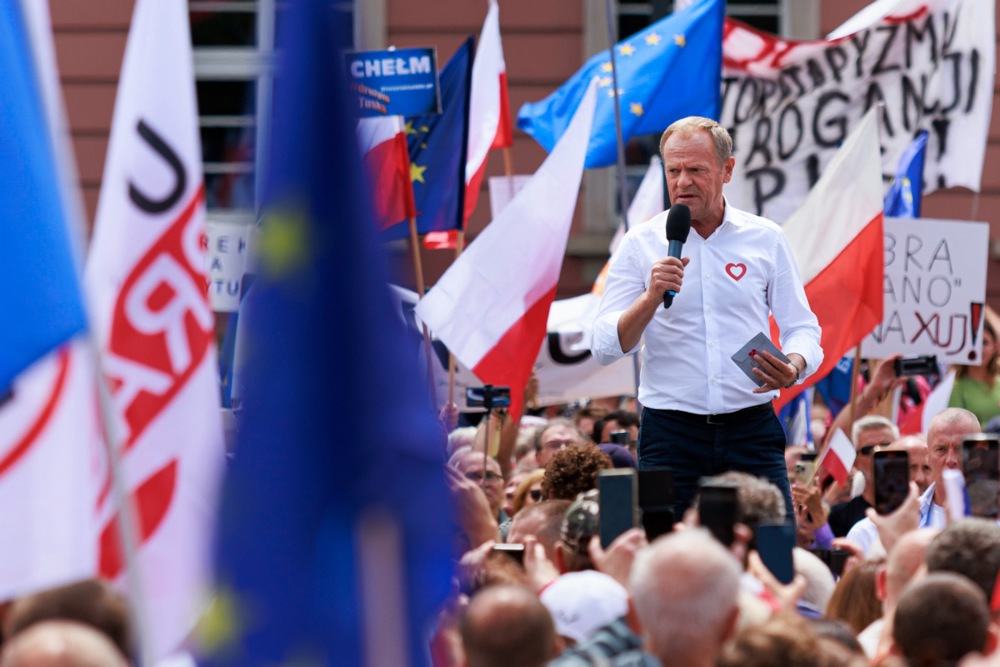The new Polish government’s abrupt dismissal of the supervisory bodies of the country’s public television broadcaster TVP and national news agency PAP risks setting an alarming precedent that must be urgently rectified by new rules to permanently protect these institutions’ independence, the International Press Institute (IPI) said today.
The previous Law and Justice (PiS) government had shamelessly turned Poland’s public media into instruments of state propaganda. The new coalition’s goal of ending this situation is therefore unquestionably justified. However, these reform efforts must take care not to perpetuate a cycle of politicization or perceived politicization. The new government must now work to pass comprehensive reform that guarantees the right of Poland’s public media to work freely and shields them from future interference by political parties of all stripes.
On Tuesday, December 19, the new parliament passed a resolution calling for the restoration of “impartiality and reliability of the public media.”
On Wednesday, the minister of culture, Bartłomiej Sienkiewicz, announced the appointment of new supervisory boards for public television, public radio and the news agency PAP, as well as the appointment of new management in the three government-owned companies.
Minutes after the dismissal of the supervisory boards, TVP’s 24-hour news channel TVP Info, was taken off air, while TVP’s Channel One aired no news bulletins throughout the day on Wednesday.
The changes provoked a furious reaction from the outgoing party of Law and Justice (PiS) whose members staged an overnight sit-in on Tuesday in the broadcaster’s headquarters, also joined by PiS leader, Jaroslaw Kaczyński.
The new government asserted its right to act on two main grounds: firstly that the establishment of the National Media Council, the supervisory body for public TV and Radio set up by PiS in early 2016, had been ruled unconstitutional in December 2016; and secondly that the ministry of culture, as the sole owner of the public radio and TV, must now take on the NMC responsibilities and exercise the authority to restore impartiality to public media.
During their eight years in government (2015 to 2023) PiS converted the public media into an unapologetically hardline propaganda outfit designed not only to promote government policy but also to aggressively delegitimize its critics and the political opposition.
IPI visited Poland in September as part of the Media Freedom Rapid Response mission and concluded that the public media had been fully converted into a propaganda arm of the ruling party. Successive reports of the Organization for Security and Co-operation in Europe (OSCE) monitoring of Poland’s elections concluded that PiS “enjoyed clear advantage through its undue influence over the use of state resources and public media” during the 2023 October elections; and that the broadcaster was ‘frequently portraying the [party’s] main challenger as a threat to Polish values and national interests’ in the 2020 Presidential elections.
“While there is no question that the TVP and Polish Radio are both in need of drastic reform, IPI is troubled by the approach adopted that appears to be stretching the rule of law,” said IPI Deputy Director Scott Griffen. “While the ultimate aim is unquestionably legitimate, such an act may set a dangerous precedent for every incoming government to use legal loopholes to overturn the actions of the previous government.”
“The government must now ensure that what emerges from the changes is a fully independent public broadcaster that represents the voices and views of all of society without discrimination. The Tusk government must work with journalists groups and media experts from across Poland to establish the necessary legal safeguards that can protect public media in the future from all forms of political interference.”
The Media Freedom Rapid Responses mission report from September 2023 outlines the full range of challenges facing media freedom in Poland including media pluralism, vexatious lawsuits and safety of journalists. We urge the Civic Platform-led government to make media independence and journalists rights a central element of their programme.
This statement by IPI is part of the Media Freedom Rapid Response (MFRR), a Europe-wide mechanism which tracks, monitors and responds to violations of press and media freedom in EU Member States, Candidate Countries, and Ukraine. The project is co-funded by the European Commission.




